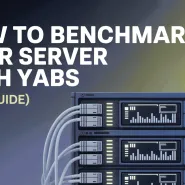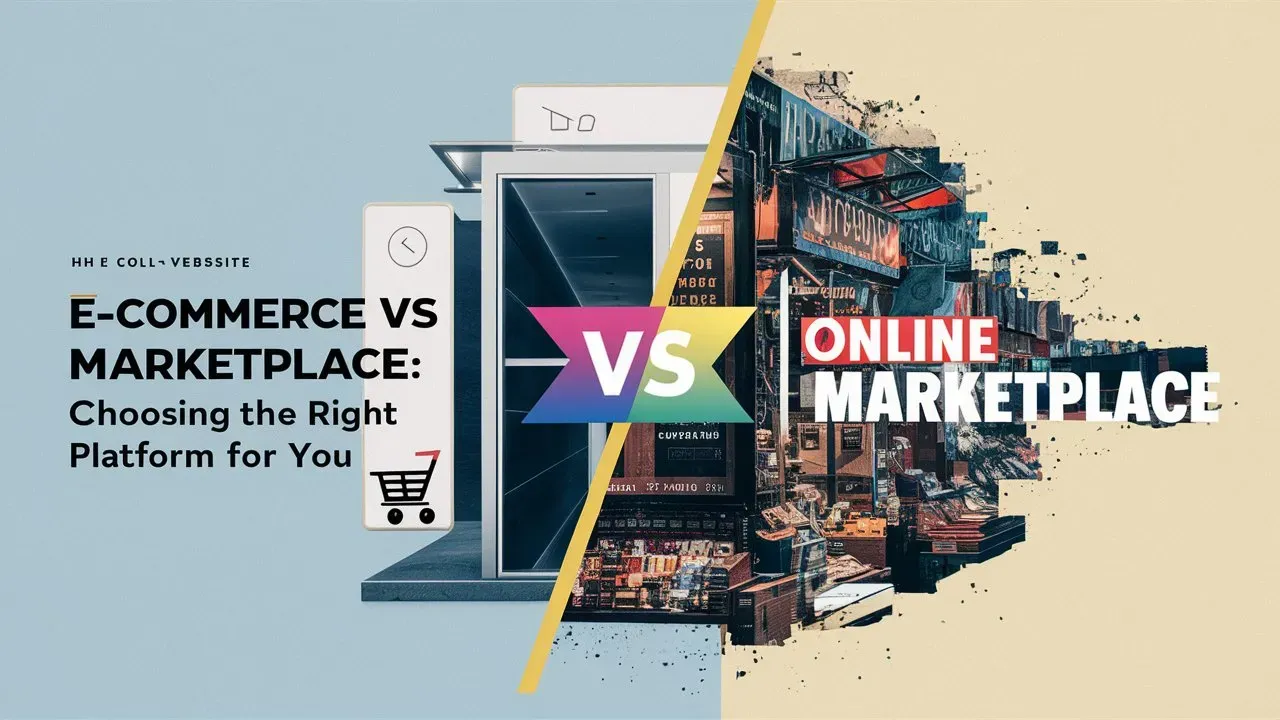Hey there, future online business owners! If you’re planning to sell stuff online in 2025, you’re probably wondering, “Should I go for an e-commerce website or a marketplace?” Don’t worry, we’ve got you covered with a simple guide to help you figure out the best choice between an E-Commerce Website vs Marketplace.
Choosing the right platform can be tricky, kind of like picking the best pizza topping—there’s a lot to think about! On one side, you’ve got e-commerce websites, where you can create your own space online and have full control over your brand. On the other hand, marketplaces like Amazon or Etsy let you reach an audience that’s already there, without the need to build everything from scratch.
So, which one is the best for you? In this guide, we’ll break down the pros and cons of both, making it easier for you to decide. Whether you’re new to selling online or already have some experience, we’ll help you figure out the best platform for your business goals. Let’s dive in and get you on the right track with Choosing the Right Platform!
We’ll cover everything you need to know about E-Commerce Website vs Marketplace, so you can make an informed decision. Whether you’re looking to start small or scale up, Choosing the Right Platform will make all the difference in your success!

Introduction to E-Commerce Platforms :
E-commerce platforms come in many different forms, each designed to serve different types of businesses. There are platforms like Shopify, WooCommerce, and BigCommerce that allow you to create your own standalone e-commerce website. These platforms give you full control over your store’s design, products, and customer experience, allowing you to build a unique brand presence. On the other hand, there are online marketplaces like Amazon, Etsy, and eBay, where you can sell your products alongside other sellers. Marketplaces offer the advantage of tapping into an already established audience, which can help you get sales quickly without having to build a brand from scratch.

Each type of platform has its pros and cons, and the choice largely depends on your business model, goals, and resources. For example, creating an e-commerce website gives you more control and flexibility, but requires more time and effort to drive traffic and build a customer base. Marketplaces, on the other hand, come with built-in traffic, but you may face more competition and have less control over your brand.
Importance of Choosing the Right Platform in E-Commerce Website vs Marketplace :

- Helps Your Business Grow: The right platform makes it easier for your business to grow. Whether it’s an E-Commerce Website vs Marketplace, choosing the right one will ensure you have the tools to scale up as your sales increase.
- Control Over Your Brand: With an E-Commerce Website, you get more control over your brand. If you choose an e-commerce website, you can customize your site to match your brand, unlike a marketplace where you have to fit into their design and rules.
- Saves You Money: Some platforms have hidden fees, like transaction fees or monthly charges. Choosing the Right Platform can help you avoid unnecessary costs, making it easier to keep your profits high and expenses low.
- Better Customer Experience: The right platform makes shopping easier for your customers. Whether you go with an E-Commerce Website vs Marketplace, a smooth shopping experience can lead to more sales and happy customers.
- Helps You Market Your Store: When Choosing the Right Platform, it’s important to consider the marketing tools available. Whether it’s SEO, email marketing, or social media integration, having the right tools can help you get more customers, whether you’re using an E-Commerce Website vs Marketplace.
- Access to Support and Features: Every platform offers different features. If you’re Choosing the Right Platform, make sure it has everything you need, like payment options and inventory management. The right platform will save you time and effort in managing your business.
- Reach More Customers: A marketplace has built-in traffic, but it also means you’ll face more competition. On the other hand, an E-Commerce Website vs Marketplace gives you more freedom but requires effort to drive traffic. Choosing the Right Platform helps you balance reach and competition.
- Set Up for Long-Term Success: Choosing the Right Platform means you’re setting your business up for long-term success. Whether you choose an E-Commerce Website vs Marketplace, the right platform will help you grow and adapt as your business evolves.
In the end, Choosing the Right Platform between an E-Commerce Website vs Marketplace can make all the difference in your business’s success. Make sure to pick the one that best fits your goals and helps you reach your target audience.
Pros and Cons of Having Your Own E-Commerce Site :
Pros :
- Complete Control Over Your Store: With your own e-commerce site, you have the freedom to design and customize everything according to your brand. You can control the layout, colors, product display, and even the customer experience, making it truly your own.
- No Marketplace Competition: On your own site, your products are the focus. You don’t have to compete with other sellers, unlike on marketplaces where your products are listed alongside hundreds or thousands of others.
- Keep More Profit: Marketplaces often take a cut of your sales, but with your own site, you keep 100% of the profit (minus payment processing fees). This can result in higher profit margins in the long run.
- Better Customer Insights: Running your own site gives you direct access to customer data, like purchase history, preferences, and browsing behavior. This information can be used to personalize marketing efforts and improve your products.
- Flexibility: You have the freedom to choose how you run your business. From payment methods to shipping options, you’re not limited by marketplace rules and can make decisions that best suit your business model.

Cons:
- Attracting Traffic is Challenging: Unlike marketplaces that come with built-in traffic, driving visitors to your own site requires time and effort. You’ll need to invest in SEO, digital marketing, and advertising to build an audience.
- Higher Setup Costs: Building and maintaining your own e-commerce site comes with upfront costs. You’ll need to pay for web hosting, design, and possibly development services, which can be a significant investment.
- More Work to Manage: Running your own site means you’re responsible for everything—product listings, order fulfillment, customer service, and more. This can be time-consuming and requires a lot of effort, especially when you’re just starting out.
- Building Trust Takes Time: Marketplaces like Amazon already have customer trust, but when you’re starting your own e-commerce site, you’ll need to establish credibility. It can take time to build trust with customers, especially if you don’t have a well-known brand.
- Technical Maintenance: Managing your own site means dealing with technical issues, like security updates, software bugs, and server maintenance. If you’re not tech-savvy, you may need to hire someone to handle these tasks.
Having your own e-commerce site offers significant benefits, like more control and higher profits, but it also comes with challenges such as attracting traffic, higher costs, and more management responsibilities. It’s important to consider both sides before making a decision.
Exploring Online Marketplaces :
An online marketplace is a website where multiple sellers can list and sell their products to customers. It’s like a big online mall where you don’t have to build your own store. Examples of popular marketplaces include Amazon, Etsy, and eBay. When Choosing the Right Platform, many businesses start by considering whether an E-Commerce Website vs Marketplace is the best option.

Key Features of Online Marketplaces :

- Multiple Sellers in One Place: Online marketplaces allow lots of different sellers to list their products in one spot, making it easy for buyers to browse and compare.
- Built-In Traffic: When Choosing the Right Platform, marketplaces come with a big audience already. You don’t have to spend as much time or money bringing customers to your store because the platform already has visitors.
- Payment Processing: Marketplaces handle payments for you, so you don’t need to worry about setting up your own payment system. It’s secure and easy for both buyers and sellers.
- Customer Service Support: Many marketplaces offer customer service, helping you resolve issues with buyers without the hassle of managing everything yourself.
- Product Listings and Search: Sellers can create product listings with descriptions, images, and prices, and buyers can search for what they want using filters. When Choosing the Right Platform, this searchability is a big advantage.
- Shipping Help: Some marketplaces, like Amazon, even help with shipping. They store your products and handle packing and delivery, making it easier for you to focus on selling.
Advantages of Using Marketplaces :
- Ready-Made Audience: The biggest advantage of using a marketplace is that you get access to a large, built-in audience. When Choosing the Right Platform, this can save you time and money compared to building traffic from scratch on your own site.
- Low Setup Costs: Setting up on a marketplace is usually cheap and easy. You don’t have to worry about building a website or paying for hosting, which can make it a great choice for small businesses or people just starting out. This makes marketplaces a good option when comparing E-Commerce Website vs Marketplace.
- Easy to Use: Marketplaces are designed to be simple. You don’t need advanced tech skills to get started, and you can list products quickly. This is a big plus when Choosing the Right Platform for your business.
- Secure Payments: Marketplaces take care of payments, so you don’t have to worry about fraud or security issues. This makes transactions safer for both you and your customers.
- Trust and Credibility: Marketplaces have built trust with customers. People feel more comfortable buying from a familiar platform, which can lead to more sales for you when Choosing the Right Platform. from a marketplace they know, which can lead to higher conversion rates for sellers.
Disadvantages of Using Marketplaces :
- Fees and Commissions: Marketplaces charge fees for listing and selling products, which can add up over time. This is something to consider when comparing E-Commerce Website vs Marketplace, as these fees can reduce your profit margins.
- Limited Control Over Branding: On a marketplace, you don’t have much control over how your store looks. Your branding has to fit within the marketplace’s rules, which can make it harder to stand out.
- Lots of Competition: Since there are many sellers on the same platform, it can be hard to stand out, especially if you’re selling popular products. When Choosing the Right Platform, you need to consider how much competition you’ll face on a marketplace.
- Dependence on the Platform: If the marketplace changes its rules or increases fees, it can affect your business. Unlike an e-commerce website, where you control everything, you’re at the mercy of the marketplace’s decisions.
- Limited Customer Data: Marketplaces don’t give you full access to customer data. This means you can’t build a direct relationship with your customers or use their data to improve your marketing. This is something to keep in mind when comparing E-Commerce Website vs Marketplace. to build direct relationships with your customers or use data to improve your marketing efforts.
When Choosing the Right Platform, deciding between an E-Commerce Website vs Marketplace depends on your business needs. Marketplaces are great for reaching a large audience quickly and with minimal setup, but they come with fees, limited branding control, and competition. If you want more control over your brand and customer experience, an e-commerce website might be a better option. Weigh the pros and cons of each to decide what works best for your business goals.
Comparative Analysis: E-commerce Website vs Marketplace

1. Cost Implications of Each Option :
- E-Commerce Website:
- Building your own e-commerce website can come with higher upfront costs. You’ll need to pay for web hosting, domain registration, website design, and development. Additionally, you’ll need to invest in marketing, SEO, and other strategies to drive traffic to your site. While there are no fees for each sale, the costs of building and maintaining the site can add up.
- Marketplace:
- Using a marketplace is generally cheaper to start. Most marketplaces don’t require significant upfront investment, and they often have no setup fees. However, they charge transaction fees, listing fees, and commissions on sales, which can add up over time. These fees can reduce your profit margins, especially as your sales grow.
2. Control Over Branding and Customer Experience :

- E-Commerce Website :
- When you run your own e-commerce website, you have complete control over your brand and customer experience. You can customize your site’s design, layout, and product presentation to align with your brand’s identity. You also have full control over the checkout process, payment options, and customer service, allowing you to create a seamless and personalized shopping experience.
- Marketplace :
- On a marketplace, you have limited control over branding and customer experience. The marketplace itself sets the rules and design, and your store will look similar to other sellers. While you can create product listings and manage your prices, the overall shopping experience is shaped by the platform, not by you. This means you might not be able to fully showcase your brand’s personality.
3. Scalability and Growth Potential :

- E-Commerce Website:
Your own e-commerce website offers more scalability in the long run. As your business grows, you can expand your product range, improve your website’s features, and optimize your marketing strategies. You’re in full control of how you scale your business, and you can make decisions based on your goals. The growth potential is high, but it requires continuous effort to drive traffic and improve the site. - Marketplace:
Marketplaces offer an easy way to scale quickly, as they come with built-in traffic. You don’t have to worry about attracting customers since the platform already has a large audience. However, growth might be limited by the platform’s fees, rules, and competition with other sellers. While you can reach more people, your ability to scale is often constrained by the marketplace’s policies and fees.
Target Audience Considerations :

1. Identifying Your Target Audience :
Before deciding between an E-Commerce Website vs Marketplace, it’s important to clearly define your target audience. Who are your ideal customers? Are they looking for niche, unique products, or are they more focused on convenience and variety? Identifying your target audience involves understanding their demographics (age, gender, location, etc.), shopping habits, and preferences. This will help you determine where your customers are most likely to shop and which platform will best meet their needs.
For example:
- If your audience values personalized experiences and unique products, they may prefer shopping on a dedicated e-commerce website where they can interact directly with your brand.
- If your audience is price-sensitive or prefers shopping from a variety of sellers, a marketplace like Amazon or Etsy might be a better fit.
2. How Audience Preferences Affect Platform Choice :
Once you know who your target audience is, their preferences will play a big role in Choosing the Right Platform. Here’s how different audience preferences can affect your decision between an E-Commerce Website vs Marketplace:
- Convenience and Trust: If your audience values convenience and shopping on trusted, well-known platforms, a marketplace could be a good choice. Marketplaces already have established trust and built-in traffic, which makes it easier for customers to feel confident making a purchase. If your audience is looking for a hassle-free shopping experience, a marketplace’s familiar interface and payment systems may be more appealing.
- Brand Loyalty and Experience: If your target audience is more focused on brand loyalty and a personalized shopping experience, an e-commerce website would give you more control over how you engage with your customers. You can create a unique shopping experience that aligns with your brand values and build long-term relationships with your customers. This is especially important if your target audience is looking for a specific brand or product that can’t be easily found on a marketplace.
- Price Sensitivity: If your audience is primarily price-sensitive and looking for deals, they may prefer the competitive pricing and discounts often found on marketplaces. Marketplaces offer easy price comparisons and may provide opportunities for your products to be discovered alongside similar items, which could attract budget-conscious shoppers.
- Niche or Specialized Products: If your products cater to a niche market, an e-commerce website might be the better option. Marketplaces often focus on mass-market products, and it can be harder for niche products to stand out. On your own site, you can tailor your content and marketing to attract your specific audience, helping you build a loyal customer base.
Marketing and SEO Strategies :

How to Market Your E-Commerce Website :
Marketing your own e-commerce website requires a multi-faceted approach to drive traffic, build brand awareness, and convert visitors into customers. Here are some strategies to consider:
- Content Marketing: Create valuable, engaging content that resonates with your audience. Blog posts, videos, and social media content can help establish your brand’s authority and attract organic traffic. Content marketing can also improve your SEO rankings by incorporating relevant keywords.
- Social Media Marketing: Leverage social media platforms like Instagram, Facebook, and Pinterest to showcase your products, engage with your audience, and drive traffic to your e-commerce site. Paid ads on these platforms can also target specific demographics, helping you reach the right customers.
- Email Marketing: Build an email list and send personalized offers, promotions, and updates to your customers. Email marketing helps maintain customer relationships and encourage repeat purchases.
- Influencer Marketing: Partner with influencers in your niche to promote your products. Influencers can help you reach a larger audience and build trust with potential customers.
- Paid Ads (PPC): Use pay-per-click advertising through platforms like Google Ads and Facebook Ads to target specific keywords and demographics. Paid ads can drive immediate traffic to your e-commerce website and increase sales.
- Referral Programs: Encourage existing customers to refer friends and family by offering discounts or rewards. This helps spread the word about your brand and brings in new customers.
SEO Best Practices for Online Marketplaces :
SEO for online marketplaces differs from SEO for e-commerce websites, but it’s still crucial for visibility and sales. Here are some SEO best practices for marketplaces:
- Optimize Product Listings: Ensure your product titles, descriptions, and images are optimized for search engines. Use relevant keywords in your product listings, but avoid keyword stuffing. Clear, concise, and well-written descriptions improve search rankings and customer experience.
- Use High-Quality Images: High-quality images are essential for both SEO and customer engagement. Marketplaces often rank listings with clear, high-resolution images higher than those with poor-quality photos.
- Leverage Customer Reviews: Positive customer reviews improve your product’s credibility and can boost its ranking on the marketplace. Encourage satisfied customers to leave reviews, as they can also influence potential buyers’ decisions.
- Competitive Pricing: Price your products competitively based on market trends and competitor pricing. Some marketplaces use pricing as a ranking factor, so being competitive can help your products rank higher in search results.
- Utilize Marketplace Tools: Many marketplaces offer tools to help sellers optimize their listings, track performance, and analyze keywords. Take advantage of these tools to improve your visibility and sales.
Differences in Marketing Strategies :
The marketing strategies for an E-Commerce Website vs Marketplace are quite different:
- E-Commerce Website Marketing:
- You have to drive traffic to your site from scratch, so SEO, content marketing, and social media campaigns are crucial.
- You can build a personalized customer experience, so email marketing, loyalty programs, and retargeting ads can be effective in converting visitors into loyal customers.
- Paid advertising (Google Ads, Facebook Ads) is often necessary to attract traffic initially, especially if your website is new and doesn’t have organic search traffic yet.
- Marketplace Marketing:
- Marketplaces already bring in traffic, so your focus should be on optimizing your product listings, pricing, and customer reviews.
- You’ll need to compete with other sellers on the platform, so standing out through quality listings and customer service is key.
- You can also take advantage of marketplace-specific tools and promotions to increase visibility, such as running sales or using featured listings.
Conclusion: Making the Right Choice Between E-Commerce Website vs Marketplace :
When it comes to E-Commerce Website vs Marketplace, the decision really depends on your business goals, budget, and how much control you want over your brand. Both options have their advantages, but Choosing the Right Platform means considering your unique needs.
If you want full control over your brand, customer experience, and long-term growth, an E-Commerce Website is a great choice. It allows you to create a personalized shopping experience, build brand loyalty, and scale your business over time. However, it requires more effort and investment in marketing, SEO, and driving traffic.
On the other hand, if you’re looking for a quicker, lower-cost option with built-in traffic, a Marketplace might be the better fit. Marketplaces like Amazon or Etsy already have a large customer base, which can help you get your products in front of more people. But, you’ll have less control over branding, and you’ll need to pay transaction fees, which can add up.
Ultimately, Choosing the Right Platform means weighing the pros and cons of E-Commerce Website vs Marketplace. If you value independence and customization, go for an e-commerce website. If you prefer ease and access to an existing audience, a marketplace might be the way to go. Keep in mind that many businesses choose to use both—starting with a marketplace and transitioning to their own website as they grow.
Whatever you decide, make sure it aligns with your business vision, and remember that Choosing the Right Platform is a key factor in your long-term success.
Checkout How to Start an eCommerce Business in India: A Beginner’s Guide
Discover more from Owrbit
Subscribe to get the latest posts sent to your email.










